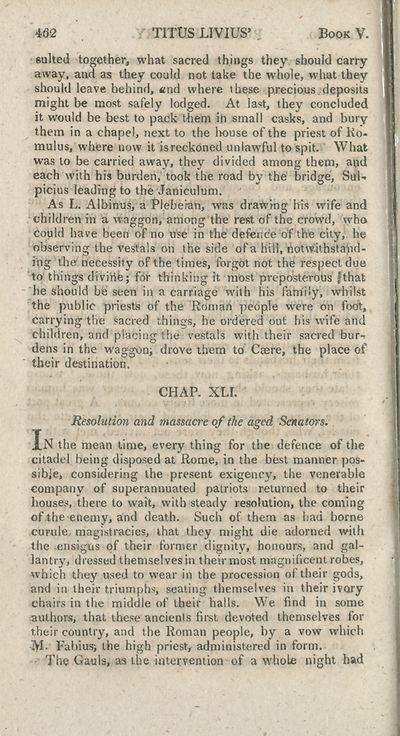Download files
Complete book:
Individual page:
Thumbnail gallery: Grid view | List view

462
TITUS LIVIUS*
Book V.
suited together, what sacred things they should carry
away, and as they could not take the whole, what they
should leave behind, «nd where these precious deposits
might be most safely lodged. At last, they concluded
it would be best to pack them ih small casks, and bury
them in a chapel, next to the house of the priest of Ko-
mulus, where now it isreckoned unlawful to spit. What
was to be carried away, they divided among them, apd
each with his burden, took the road by the bridge, Sul-
picius leading to thie Janieulum.
As L. Albinus, a Plebeian, was drawing his wife and
children in a waggon, among the rest of the crowd, who
could have been of no use in the defence of the city, he
observing the vestals on the side of a hill, notwithstand¬
ing the necessity of the times, forgot not the respect due
to things divirife; for thinking it most preposterous jthat
he should be seen in a carriage with his family, whilst
the public priests of the Roman people were on foot,
carrying the sacred things, he ordered out his wife and
children, and placing the vestals with their sacred bur¬
dens in the waggon; drove them to Csere, the place of
their destination.
CHAP. XLI.
Resolution and massacre of the aged Senators.
In the mean time, every thing for the defence of the
citadel being disposed at Rome, in the best manner pos¬
sible, considering the present exigency, the venerable
company of superannuated patriots returned to their
houses, there to wait, with steady resolution, the coming
of the enemy, dnd death. Such of them as had borne
curule, magistracies, that they might die adorned with
the ensigns of their former dignity, honours, and gal¬
lantry, dressed themselves in their most magnificent robes,
which they used to wear in the procession of their gods,
and in their triumphs, seating themselves in their ivory
chairs in the middle of their halls. We find in some
authors, that these ancients first devoted themselves for
their country, and the Roman people, by a vow which
•VI- Fahius; the high priest, administered in form.
The Gauls, as the intervention of a whoLe night had
TITUS LIVIUS*
Book V.
suited together, what sacred things they should carry
away, and as they could not take the whole, what they
should leave behind, «nd where these precious deposits
might be most safely lodged. At last, they concluded
it would be best to pack them ih small casks, and bury
them in a chapel, next to the house of the priest of Ko-
mulus, where now it isreckoned unlawful to spit. What
was to be carried away, they divided among them, apd
each with his burden, took the road by the bridge, Sul-
picius leading to thie Janieulum.
As L. Albinus, a Plebeian, was drawing his wife and
children in a waggon, among the rest of the crowd, who
could have been of no use in the defence of the city, he
observing the vestals on the side of a hill, notwithstand¬
ing the necessity of the times, forgot not the respect due
to things divirife; for thinking it most preposterous jthat
he should be seen in a carriage with his family, whilst
the public priests of the Roman people were on foot,
carrying the sacred things, he ordered out his wife and
children, and placing the vestals with their sacred bur¬
dens in the waggon; drove them to Csere, the place of
their destination.
CHAP. XLI.
Resolution and massacre of the aged Senators.
In the mean time, every thing for the defence of the
citadel being disposed at Rome, in the best manner pos¬
sible, considering the present exigency, the venerable
company of superannuated patriots returned to their
houses, there to wait, with steady resolution, the coming
of the enemy, dnd death. Such of them as had borne
curule, magistracies, that they might die adorned with
the ensigns of their former dignity, honours, and gal¬
lantry, dressed themselves in their most magnificent robes,
which they used to wear in the procession of their gods,
and in their triumphs, seating themselves in their ivory
chairs in the middle of their halls. We find in some
authors, that these ancients first devoted themselves for
their country, and the Roman people, by a vow which
•VI- Fahius; the high priest, administered in form.
The Gauls, as the intervention of a whoLe night had
Set display mode to:
![]() Universal Viewer |
Universal Viewer | ![]() Mirador |
Large image | Transcription
Mirador |
Large image | Transcription
| Antiquarian books of Scotland > Curiosities & wonders > Titus Livius' Roman history > (466) |
|---|
| Permanent URL | https://digital.nls.uk/115988741 |
|---|
| Description | Thousands of printed books from the Antiquarian Books of Scotland collection which dates from 1641 to the 1980s. The collection consists of 14,800 books which were published in Scotland or have a Scottish connection, e.g. through the author, printer or owner. Subjects covered include sport, education, diseases, adventure, occupations, Jacobites, politics and religion. Among the 29 languages represented are English, Gaelic, Italian, French, Russian and Swedish. |
|---|

